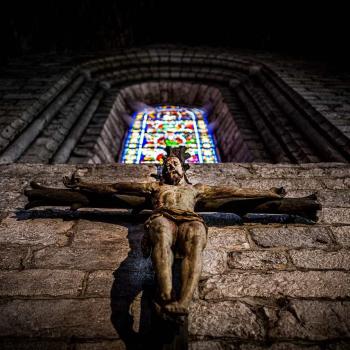
“For you have died, and your life is hidden with Christ in God” (Colossians 3:3).
How exactly does this “spiritual dying” fit in with the practice of contemplative spirituality? One reader of this blog is curious about this. In response to my post from a few weeks back (Why is “Mysticism” a Dirty Word), I received the following message on Facebook:
Thank you for your thoughts on mysticism’s more dubious meanings, my learned friend. I’m afraid I’ve been shallow in my understanding, based as it is in experience. I’m not widely read on the subject, not even Underhill. But I hope to correct that. Meanwhile, I was intrigued by your statement that moving beyond the experience seems like dying. I’d love to hear you expand on that in another blog post. Again, thanks for expanding my awareness.
First of all, no need to dismiss your understanding of mysticism as “shallow.” I think that probably the most common way that people think about mysticism, at least in a theistic sense, is in terms of “experience of God.” I’ve known so many people who say “I don’t just want to believe in God, I want an experience of God.” In other words, it’s not enough to read the Bible or some other book that explains how other people encounter God, I want that encounter for myself.
So I don’t think it’s a “shallow” way of approaching mysticism at all. I think it’s normal, and maybe a perfectly good starting point. I think the problem comes if we decide that the “experience” is all that matters, and if we insist that only certain types of experiences really qualify as “God.” At that point I think we’ve fallen for idolatry: we worship the experience, rather than God. That’s what we have to watch out for. And I think that’s why so many of the mystics tend to caution us against putting too much stock into our experiences, or feelings, or visions, or insights, or spiffy altered states, or whatever. Anything like that runs the risk of reducing God to some sort of entertainment.
I meditate or pray or fast or walk the labyrinth and then I have a “wow!” experience. But is that really God? Or is it just a self-satisfied ego? So discernment is important too. Because if anyone is serious and dedicated to silent prayer, or meditation or other types of spiritual disciplines, eventually there will be some sort of lovely or awe-inspiring experience. It’s going to happen, sooner or later. And the mystics advise us, when it does, to just let go of it.
But on to the heart of your question. What do I mean when I say that letting go of an experience-based spirituality feels like dying? Here’s where I’m coming from: any kind of spiritual experience tends to be catnip for the ego. It feels good to have a sense of God’s presence, or better yet of union with God, or — coolest of all — some sort of heightened or altered or cosmic state of consciousness.
Like I said — “wow!” And even though such moments might involve a temporary sense of what Bernadette Roberts calls “the experience of no-self,” they don’t last — the ego pops back in, usually as soon as it starts thinking “wow”! And it reinforces its position within us by exulting in how good the “spiritual experience” feels. So we get a high off of God, but in doing so, we reinforce the very structure of consciousness that wants to retain control and keep the liberating power of the Spirit at arm’s length.
So if we are serious about wanting union with God, sooner or later we have to give the ego a break and let God run the show. And frankly, I think God could care less if we have nifty spiritual experiences or not. God wants our hearts, God wants our will, God wants us to embody Christ — and that means humility, patience, self-forgetfulness, compassion, service. In other words, virtue, holiness, self-surrender. And that’s what feels like dying, because the ego is no longer getting its catnip fix of spiritual highs that come from meditation or whatever else we’re doing as a prayer discipline. The discipline frankly becomes boring, tedious, dull.
So many people give up at this point, off looking for a new spiritual high somewhere else: same ego, different guru. But if we stay put, and persevere through the boring ordinariness of our prayer and meditation, we may find that the spiritual highs are rare to non-existent, but other blessings come in their place: a sense of connection. A tenderness of heart that makes it easy to love and forgive. A keen awareness of our own brokenness and need for God’s love, mercy and forgiveness. Tears that flow when we recognize how broken we are, how broken the world it, and yet how lavish God’s love is anyway.
It’s not dying in the sense of your heart stopping or your breath ceasing. It’s more of a letting go of the need to be in control, to be entertained, to be self-aware. It’s my understanding from my favorite book about death, The Grace in Dying, that the dying process typically leads to a place of profound peace and serenity — but there may be all sorts of struggle before reaching that place, simply because we fear death so much. I think the process of spiritual dying is not unlike the process of physical dying. I hope this is helpful. One more thought: just because we experience this once doesn’t mean we’ve somehow “arrived.”
I think dying-to-self is a process, like so much of the spiritual life. And like any process, it has to repeated, perhaps many times, over the course of a life. So we die to self, and then we find that the old need-to-be-in-control shows up again. And God is gracious, and patient, so we’re invited to do it again, and again. “Always we begin again.” Therein lies the beauty and the terror of the spiritual journey.
What about you, dear readers? How do you understand the role of (spiritual) dying in your spiritual life? Please share your thoughts in the comments section below.
Enjoy reading this blog?
Click here to become a patron.














